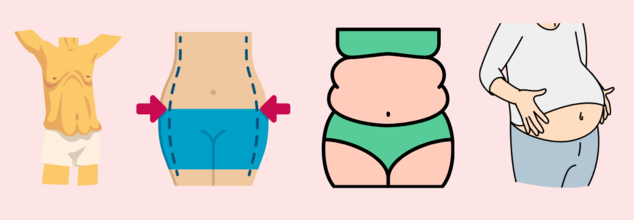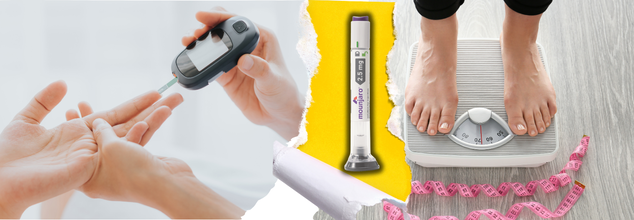- Health Conditions A-Z
- Health & Wellness
- Nutrition
- Fitness
- Health News
- Ayurveda
- Videos
- Medicine A-Z
- Parenting
- Web Stories
Where You Body Stores Fat Could Reveal A Lot About Your Health

Credits: Canva
Nobody likes the extra bulge around your stomach. However, like it or not, many of us have it. If your health goal is to lose weight and that extra bulge, it is important for you to know what may be causing it? Everyone has a unique kind of body type. The theory called the Body Type theory created by Dr Eric Berg believes that when you understand your body type, then you can easily identify the area of concern that needs exercise. It can also help you adapt to lifestyle and nutrition changes.
For many, who maybe otherwise fit, the problem area is belly. This is because fat is easily deposited in the abdominal area and can be the most stubborn of all to lose. But, what kind of fat is it? Is it hormonal fat? Is it stress fat? Or is it just a weight gain?
Body Types
As per Dr Berg, there are for body types which determines where the fat is deposited in your body.
- Sagging Belly
- Hip and Thighs
- All over
- Protruding Belly
All such body types are linked with a kind of change your body undergoes that stores fat. Let us explore.
Adrenal Body Type
This is called the adrenal belly, which is caused by high levels of cortisol. This happens when someone is going through stressful periods, and the production of cortisol increases. As a result, fat accumulates around the waste and then leads to saggy abdomen. This happens to both men and women. This can also lead to fatigue, back pain, nervousness, poor memory and sleep problems.
In order to manage your stress belly, it is important that you manage your stress levels and ensure that you get enough sleep. Do ensure that your diet is balanced, and you are getting proper protein in your diet.
Thyroid Body Type
This happens when there is an increased production of estrogen. This hormone can increase belly weight gain and cause the so called thyroid belly or hormonal belly. People with such a body type tend to gain weight in the upper and the lower body simultaneously. The fat is also distributed throughout the entire body. Those with thyroids conditions could also experience heavy periods, digestive liver issues, and lower metabolism.
There are also ways to tell if you have a thyroid belly type. If you suffer form frequent headaches, poor circulation, hair loss or brittle fingernails. These people also crave sweets, however, this instant carb further leads to a stubborn belly fat.
Ovary Body Type
This is specific for women, where the weight is gained near thigh and lower belly areas. This is also caused by excess estrogen hormones and happens when the woman is undergoing exceptional hormonal changes. This usually takes place during menstruation or child birth.
This could also caused heavier periods, headaches, acne outbreaks, and even ovarian cysts.
Liver Body Type
This happens when your midsection looks like a pot and your arms and legs are thin. This is caused by liver and bile problem. When you belly sticks out more than the adrenal body type, and is made of fat tissue that accumulates due to a decreased production or impaired release of bile, it means you may have a low blood sugar levels, especially in the morning.
This is more common in men and can have issues like bloating, flatulence, and other digestive problems, as well as backpain.
This also happens due to consumption of high levels of alcohol and sugar sodas.
Airborne Fungi Might Predict Surges In Covid And Flu, Researchers Say

Credits: Canva
A recent study presented at the American Society for Microbiology's annual meeting (ASM Microbe 2025) in Los Angeles has uncovered a surprising link between airborne fungal spores and short-term spikes in flu and COVID-19 cases. The research, conducted by scientists from Lynn University in Florida, suggests that monitoring outdoor levels of fungal spores could provide an early warning system for potential outbreaks.
Not Just Human Contact: A New Environmental Player
Traditionally, respiratory illnesses like flu and COVID-19 have been associated mainly with human-to-human transmission. But this new research introduces an environmental twist: airborne fungal spores — microscopic particles released by fungi into the air — may play a significant role in triggering infection surges.
Researchers found that when levels of fungal spores in the outdoor air increased, there was a corresponding rise in COVID-19 and flu infections in the days that followed. What’s more, the relationship was strong enough that statistical and machine learning models could predict these spikes with a high degree of accuracy.
Interestingly, the same predictive relationship did not hold true for pollen, another common airborne particle. This indicates that fungal spores may have a more specific and direct impact on respiratory health than previously assumed.
Data from the Tropics: What Puerto Rico Revealed
The research team focused their study on two major health regions in Puerto Rico — San Juan and Caguas — collecting data from 2022 to 2024. They tracked the daily incidence of flu and COVID-19 diagnoses alongside environmental measurements of fungal spores and pollen.
Using both traditional statistical analysis and machine learning models, they examined whether spikes in fungal spore concentrations could predict increases in infections within the same week or the following week — a concept known as a lag effect. The results were striking: in many instances, elevated levels of fungal spores were followed by noticeable jumps in flu and COVID-19 cases.
A Tool for Better Public Health Planning
“This research gives us a new lens through which to view respiratory virus outbreaks,” said Felix E. Rivera-Mariani, Associate Professor of Biochemistry at Lynn University and lead researcher on the study. “By monitoring environmental data like fungal spores, we can potentially issue earlier warnings and protect high-risk communities.”
Rivera-Mariani emphasized that this approach could be especially useful in the fall — a season that already sees increased viral transmission — when fungal spore levels are often high due to decaying plant matter and damp conditions.
He added that this discovery highlights a broader message: “Environmental triggers, not just interpersonal contact, may influence how and when people get sick. That insight could help shape future public health responses and inform protective guidelines, particularly in regions with high fungal activity.”
Who Stands to Benefit?
The findings may be especially valuable for protecting vulnerable populations such as the elderly, individuals with asthma, or people with allergic rhinitis. These groups are not only more prone to respiratory infections but may also be more sensitive to environmental irritants like fungal spores.
By incorporating airborne fungal spore monitoring into existing public health surveillance systems, authorities could issue timely alerts and recommendations — including when to wear masks, avoid outdoor exposure, or ramp up testing.
While more research is needed to fully understand the biological mechanism behind this connection, the evidence presented marks a promising step toward using environmental data to predict — and possibly prevent — future outbreaks.
Childhood Trauma Increases The Risk Of Poor Academic Performance - Even If It Is Just One Instance

(Credit-Canva)
Childhood trauma affects many kids and most adults as well. Kids may not understand the word 'trauma' and how it can affect them; however, the impact of difficult situations often surfaces in different ways. According to the National Children’s Alliance, in 2022 an estimated 558,899 children were victims of abuse and neglect. Even if they are too young to understand the consequences of these actions, childhood trauma can affect these children well into adulthood and sometimes throughout their lives.
A new study shows that tough childhood experiences like violence, addiction, and abuse can make it harder for kids to succeed in school. The study found that children who've been through even just one traumatic event are more than twice as likely to miss a lot of school due to health problems. The more bad experiences a child has, the more school they tend to miss.
What Are The Risk Factors of Poor Academic Performance for Kids?
During this study, researchers looked at information from over 10,000 children aged 6 to 17. They found that about 1 in 4 (24%) of these children had gone through at least one difficult event, including:
- Violence
- Having a parent in jail
- Living with someone in the household who is mentally ill, addicted to drugs, or an alcoholic
- Verbal or emotional abuse
- Not having basic needs like food or housing
- Discrimination because of their race or background
The study showed that kids who went through these traumas were 2.4 times more likely to be chronically absent from school. This means they missed at least 10% of school days because of health reasons. And for every extra traumatic event they experienced, their risk of missing school due to health increased by 25%.
Specific Traumas Mean Higher Risks of Missing School
The study pinpointed which traumatic events had the strongest connection to children missing more school. Being exposed to violence significantly increased the odds, making kids 2.6 times more likely to be chronically absent. Discrimination, such as unfair treatment because of their background, also boosted the risk of missing school by 2.5 times. Furthermore, living with a mentally ill person in the home increased a child's risk of chronic absenteeism by 2.2 times. These specific findings underline the direct impact of certain adversities on a child’s consistent presence in school.
The researchers strongly suggest that doctors and teachers should team up to identify children who have gone through trauma. They believe it's crucial to offer these kids support early on, especially if they start missing school often. Researchers emphasized the need for "new ways” so that schools and healthcare systems to work together and provide kids with the best support. The goal is to support these students before they miss too much school, preventing them from falling behind and experiencing even worse health and academic problems down the line. It's about building a safety net for our most vulnerable learners.
As Mounjaro Kwikpen Gets Greenlight In India: How Can Once-Weekly Shot Help Manage Diabetes And Lose Weight?

Credits: Health and me
The approval of Eli Lilly’s Mounjaro (tirzepatide) KwikPen by India’s Central Drugs Standard Control Organisation (CDSCO) marks a significant development in diabetes and obesity management, not only for India but for the world. With the increasing incidence of type 2 diabetes and obesity globally, the launch of a weekly, easy-to-administer injectable has the potential to redefine the way patients and physicians treat chronic metabolic disease.
Type 2 diabetes impacts more than 37 million individuals in the United States alone, with the overwhelming majority treating their condition by blending lifestyle modification and pharmaceutical therapy. Typically, insulin therapies have involved daily injections, which can be unpleasant and result in suboptimal compliance. It is this challenge that has generated innovation within the disease field, with the creation of incretin mimetics—medicines that replicate hormones that play a key role in glucose control and satiety regulation.
The history of incretin mimetics starts in an unexpected place, the venom of the Gila monster, a lizard that can keep blood sugar level steady when it fasts for long periods. This biological oddity led to the development of exenatide (Byetta), the first of a new generation of diabetes medicines. The area has since moved quickly, with newer and more potent agents such as dulaglutide (Trulicity), liraglutide (Victoza), and semaglutide (Ozempic) making their way into the market, several of which are also used to manage weight.
What Sets Mounjaro Apart From Other GLP-1 Drugs?
Mounjaro, or tirzepatide, is the newest innovation. Unlike previous medications that only addressed one hormone pathway (GLP-1), Mounjaro is the first and only drug to engage both GLP-1 (glucagon-like peptide-1) and GIP (glucose-dependent insulinotropic polypeptide) receptors. Both of these hormones regulate blood sugar and hunger, so Mounjaro is a dual-action therapy for diabetes and obesity.
The newly approved KwikPen form is a pre-filled, multiple-dose pen designed for subcutaneous injection. Its easy-to-use design allows accurate dosing and more convenience, with patients being able to self-administer the drug weekly. The pen releases four doses, with a residual amount of liquid left over after each use—a standard aspect that guarantees full dosing.
The clinical evidence backing Mounjaro's approval is strong. In clinical trials, tirzepatide has shown to decrease hemoglobin A1c (HbA1c)—an important measure of long-term blood glucose control—better than many other drugs. For example, in phase 3 trials, weekly tirzepatide decreased HbA1c levels dramatically, with most patients reaching the target level of 6.5% or less.
But most newsworthy of all is the effect of Mounjaro on weight. Patients taking tirzepatide have achieved mean weight losses of as much as 20% of body weight, significantly greater than the outcome with previous anti-obesity drugs. This is especially meaningful considering the high correlation between excess weight, diabetes, and cardiovascular risk.
How Does the Mounjaro KwikPen Work?
Mounjaro KwikPen is a prefilled, single-patient-use, multi-dose pen that delivers 0.6 mL per injection. It comes in six dosage strengths of 2.5 mg to 15 mg and is administered as a small once-weekly injection into the thigh or abdomen. The pen is designed for simplicity and includes a little more than the total amount of usable liquid to permit priming prior to each injection.
For patients, it is simple: a single weekly injection, with a minimal amount of training needed. The side effects of nausea or constipation are frequent but usually mild and short-lived, particularly when the dose is ramped up gradually under doctor's care.
How Does Mounjaro Support Weight Management?
Tirzepatide's dual mechanism assists with regulating appetite and metabolic health in a number of ways:
Appetite Control: By influencing hunger-controlling centers in the brain and slowing down gastric emptying, Mounjaro makes patients feel full for longer and minimize total calorie intake.
Fat Metabolism: Clinical information indicates enhanced fat metabolism and decreased body fat, apart from total weight.
Blood Sugar Regulation: Increased insulin release and lower glucose levels further assist in weight loss by maintaining energy utilization and storage stability.
How Does Mounjaro Help Manage Diabetes?
Perhaps the most important obstacle to successful management of diabetes has been the hassle of daily injections. The Mounjaro KwikPen eliminates this with a once-weekly dosing regimen that studies indicate improves compliance. Patients on weekly regimens in one trial remained with their therapy an average of 333 days, compared with 269 for patients treated daily.
The design of the pen also minimizes the danger of dosing errors and makes self-injection less daunting, particularly for patients new to injectable treatments. Any remaining liquid in the pen after four doses is normal and does not signify a problem—a major relief for patients.
Who Should Consider Mounjaro KwikPen?
Mounjaro is used in adults with type 2 diabetes, especially those who have an excess weight or obesity and are at increased risk of cardiovascular disease. It is also being evaluated for use in a wider range of obesity treatments pending regulatory approval.
In individuals who do not have diabetes, the indications for use reflect those for other anti-obesity medications: a body mass index (BMI) of 30 or more, or 27 and over with at least one weight-related medical condition like high blood pressure or elevated cholesterol.
Vouching for the wave of weekly therapies, recent studies like QWINT-1 and QWINT-3 have shown that once-a-week insulin injections yield equal reductions in A1C as daily regimens with more convenience and better adherence. In QWINT-1, study participants achieved an A1C decrease of 1.31% on weekly efsitora compared with 1.27% on daily insulin glargine. These results support the value of weekly injectables like Mounjaro in clinical use.
Accessibility and Affordability
Though promising, availability of Mounjaro and other such drugs is still a challenge. In the United States, the price can go anywhere from $1,000 to $1,500 for a month, and the treatment for obesity is not covered under Medicare, although some private providers do reimburse. Pricing and insurance coverage in India will be crucial in deciding how widely the KwikPen finds acceptance.
Another concern is supply: the surging demand for incretin mimetics has caused intermittent shortages, especially for the most in-demand formulations. Providing persistent access will be essential as more patients ask for these treatments.
Mounjaro KwikPen's approval in India is not just a regulatory first—it's a sign that the paradigm of metabolic disease care is shifting. With its two-part mechanism, demonstrated effectiveness in both blood glucose control and weight reduction, and patient-centered design, Mounjaro has the potential to be a foundation of diabetes and obesity treatment.
© 2024 Bennett, Coleman & Company Limited

